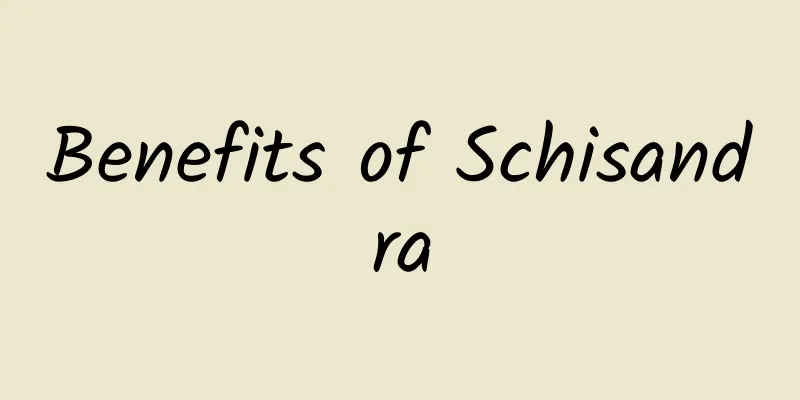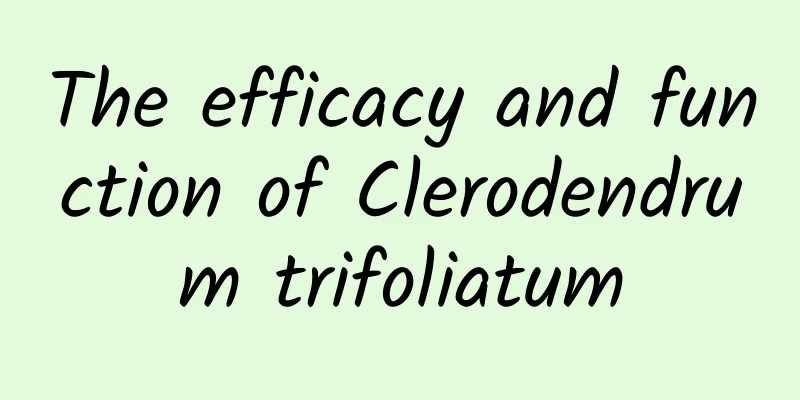Benefits of Schisandra

|
Schisandra chinensis, as the name suggests, is a medicine composed of five flavors and medicinal properties. It has five medicinal flavors: pungent, sweet, sour, bitter and salty. It has very good therapeutic effects on our human organs. In fact, more than two thousand years ago, royal nobles had learned to use Schisandra chinensis as a medicine to make various nourishing foods. So what are the effects and functions of Schisandra chinensis? Schisandra chinensis has many functions and effects. It can not only protect our heart function, but also delay aging, reduce inflammation and relieve pain, and enhance kidney function. Below I will give you a detailed introduction to the efficacy of Schisandra chinensis. Benefits of Schisandra Schisandra chinensis, also known as Xuanji, Huiji, Wumeizi, Shanhuajiao, Zhuangwei, Wuwei, Diaoliu, etc., is recorded in Tang Dynasty's "Newly Revised Materia Medica" that "the skin and flesh of Schisandra chinensis are sweet and sour, the core is bitter and spicy, and both have salty taste", hence the name Schisandra chinensis. Schisandra chinensis is divided into two types: southern and northern. Ancient medical books call it Xuanji, Huiji, and it was first listed as a top-grade medicine in Shennong's Herbal Classic. The effect of Chinese medicine lies in its nourishing and strengthening power. It has extremely high medicinal value and has the effect of strengthening the body. Efficacy and function Schisandra has remarkable benefits, including: 1. Protect the liver and regenerate liver tissue: The liver is the central detoxification organ of the human body, responsible for filtering out toxic substances to avoid harm to the human body. 2. Schisandra chinensis has an anti-inflammatory effect to stop liver damage, activate the anabolic process to promote the repair of damaged liver cells, and enhance the activity of deoxyribonucleic acid (DNA) synthesis and ornithine decarboxylase to regenerate liver cells. Carbon tetrachloride (CCl4) is one of the substances most toxic to the liver. Numerous studies have shown that Schisandra chinensis's potent liver-protective properties can counteract the toxic effects of CCl4. This shows that Schisandra has great efficacy in protecting the liver from everyday toxins! 3. Protect and enhance heart function. Schisandra chinensis is beneficial to oxygen exchange in tissue cells, and has been shown to have a protective effect on heart tissue in some cases of hypoxia and myocardial damage. It can also slow down heart rate and relieve high blood pressure. 4. Improve intelligence and health. Schisandra activates the nervous system, improving reflexes, mental focus and coordination, and enhancing mental clarity. Although it has an energizing effect, it does not have the jittery side effects of caffeine. These tiny berries are sometimes used to treat depression and can help relieve irritability and forgetfulness. Schisandra can enhance endurance and strength and speed up recovery. 5. Resist free radical damage. Free radicals are the main cause of atherosclerosis, cancer, coronary heart disease and immune deficiency, and are also the culprit that accelerates the aging process. The lignans contained in Schisandra chinensis are powerful antioxidants that can inhibit free radicals and increase the level of glutathione, an antioxidant in the liver. 6. Delay the aging process. Research reports show that Schisandra chinensis is often used as an anti-aging and qi-boosting supplement, and the results of this study further illustrate this principle. Studies have found that the lignans contained in Schisandra can enhance the energy production of adenosine triphosphate (ATP) or mitochondria (the cell's energy store), while protecting mitochondria from oxidative stress. These effects explain why Schisandra may slow the aging process and delay the onset of age-related diseases such as heart failure, Alzheimer's disease, and Parkinson's disease. 7. Nourish and enhance kidney function. From a TCM perspective, Schisandra chinensis is often used to nourish the kidneys and promote the production of body fluids, helping to treat night sweats, thirst and frequent urination. It is also helpful in treating urinary incontinence and premature ejaculation. 8. Powerful adaptogen. Schisandra is one of the most potent plant adaptogens, enhancing intellectual, physical, and sensory functions, and increasing resistance to stress. In short, it helps the body withstand stress factors such as cold, heat, noise, and emotional overload, thereby helping to improve work performance, increase endurance, and reduce fatigue. 9. Liver protecting effect. (1) Schisandra chinensis can promote bile secretion and accelerate the excretion of toxic substances such as alcohol in the liver. (2) Schisandra chinensis is rich in a variety of active ingredients, which can enhance the biological activity of enzymes such as GSH-PX and SOD, protect liver cell membranes, resist lipid peroxidation, promote protein biosynthesis and liver glycogen production, and promote the repair and growth of damaged liver cells and inhibit liver cell pathology. (3) Schisandra chinensis can promote the liver's detoxification process, protect the liver from toxicity, and regenerate liver tissue damaged by alcohol abuse, drug abuse, or hepatitis. After reading the above about the effects and functions of Schisandra chinensis, I believe everyone has a general understanding of it. In fact, Schisandra chinensis is indeed a health-care Chinese medicine for strengthening the body. Schisandra chinensis is rich in vitamins, organic acids, etc. It is one of the three major tonic herbs that can combine essence, qi and spirit. But Schisandra chinensis is a medicine after all, so it is crucial to consult a doctor before taking it. |
<<: Dandelion soaked water benefits
>>: The efficacy and function of Chinese medicine Senecio
Recommend
Rare lunar "soil": exploring the extraordinary value of lunar soil
Chang'e 6 returned triumphantly, bringing bac...
Change from injection to oral administration! How amazing is the technology of the "magic weight loss drug" semaglutide tablets?
In January 2024, semaglutide tablets were approve...
Instant noodles are banned for being too spicy! There is so much science behind eating spicy food
About one-third of the world's population eat...
A shell is not a shell, left and right are always relative
Since the Cambrian Period of the Paleozoic Era, b...
The efficacy and function of Jinlan
Jinlan is a medicinal material that is quite comm...
The efficacy and function of chicken claw celery
Chicken Claw Celery is a medicinal material. If w...
Aspartame is harmful to cardiovascular system, so we can no longer drink sugar-free beverages?
Studies have found that aspartame can damage the ...
The global fine chemical distribution ecosystem has undergone a profound transformation. Oracle NetSuite helps ECHEMI pursue its global dream
Source: 199 IT ; Author: 199IT Ralf In recent yea...
Never flooded for more than 600 years! Why is the Forbidden City not afraid of heavy rain?
Review expert: Wang Shengwei, Senior Engineer, Be...
Increased uric acid leads to gout, not just because of beer, seafood and barbecue...
Audit expert: Wang Xuejiang Professor, Capital Me...
Deliciousness and virtue coexist, the ancients' "chicken on the tip of the tongue" actually has so many meanings!
my country is one of the earliest countries to do...
Sad! One-third of the world's Javan rhinos have been killed by their hunting rifles
Recently, the Indonesian police reported a horrif...
"How Much Nutrition Do You Know" Series | Assorted Oatmeal Rice, Old Duck Barley and Winter Melon... Whole grains can also be delicious
Eating more whole grains is good for maintaining ...
What are the effects and functions of cuttlefish bones?
Most people may be very unfamiliar with cuttlefis...
The efficacy and function of Pearl Wind
We are all familiar with pearl wind. Pearl wind i...









